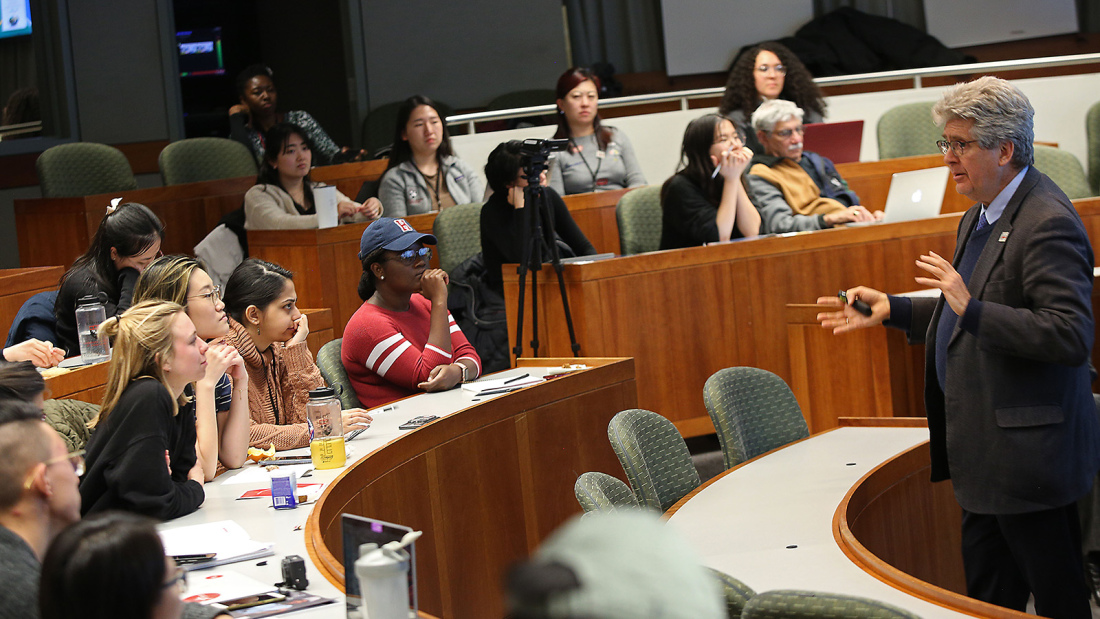

Post-Graduate Studies: Everything to Know About the Highest Levels of Education
- By Emily Summers
- December 13, 2019
After graduating high school or earning your GED, you will reach a crossroads that could determine your future career: enter the job market and begin looking for a job that best suits your talents and financial needs, or enter post-secondary education and attend college, vocational school, or earn any certificate course before entering the workforce.
But should you decide on attending college and graduate, you also have the option of entering the highest levels of education: post-graduate studies. Not very many people end up taking post-graduate studies because a hard requirement to enter is getting a college diploma. But if you’re interested in entering a specialized school or becoming a master or doctorate in your field, here is what you need to know.
Undergraduate Programs
Labels in higher education, should i take the highest levels of education, undergraduate vs. graduate vs. post-graduate.
Let’s clear up some terms used should you consider pursuing a college career. There are three terms you need to know if you’re considering entering the higher levels of post-secondary education: undergraduate, graduate, and post-graduate .
An undergraduate program is a program you apply to after finishing your secondary education. Not all high school graduates end up going to college and taking up undergraduate programs, but you’ll notice that your classroom might be filled with 20 or more students because a lot of the courses you take in the first two years are mostly general education courses before you get to more specialized courses for your majors that might have fewer students in one room.
It’s relatively easier to transfer colleges or universities in the middle of an undergraduate program because most undergraduate programs in colleges are roughly the same. Should you decide to drop out of college at any point, because you did not graduate the program, you can only say that you are an “undergraduate.”
A graduate can refer to a person who has finished their undergraduate program and no longer seeks further education, or a person taking further studies after their undergrad but has not fully completed the program.
Graduate programs in colleges and universities lead to master’s degrees, which are given to people who finish the program and master the field of their choice. As such, you’ll notice that undergraduate and graduate programs have major differences.
First, graduate programs are more specialized; these do not have general education courses and its classes are more focused on its specialization. Second, there are fewer students. In some cases, graduate students attend one-on-one classes with their professors. Third, graduate studies are more research-based, so you’ll see fewer forms of classwork.
And fourth, it is more difficult to transfer universities for graduate studies because universities can offer unique programs that no other university provides. For example, if an undergraduate psychology major decides to transfer universities, they can easily find other universities and colleges that offer the same undergraduate programs for psychology majors. But if a graduate student studying forensic psychology decides to transfer, they’ll find that their options are much more limited.
Post-Graduate Studies: The Highest Level of Education
Post-graduate programs can refer to all the programs offered after secondary education. This encompasses undergraduate programs, graduate programs, doctorate programs, and specialized institutions like law school and medical school.
Because there are multiple branches of education available depending on what you decide to study, it’s hard to determine which the highest educational level is as it varies between the fields you choose to take. The most common is a Doctor of Philosophy (styled as PhD or Ph.D.), which is the highest university degree you can get in the academe for any discipline outside of science and medicine.
For example, if a person decides to take an undergraduate program in history, while they are studying, they are known as a history major or a history undergrad. Once they graduate the program, if they decide to leave the academe and enter the job market, they are known as history graduates. Should they decide to attend graduate school and specialize in a certain field of history, they are still known as history graduates until they complete the program, and then they earn the title of Master of Arts in History. And if they continue and finish studying history under a doctorate program, they become a Doctor of Philosophy in History.
This may be different should they follow certain paths. For example, if you decide to follow the path to become a lawyer , the highest attainment you can get is a Juris Doctor degree, also known as a J.D. You’ll still have to pass the bar exams to earn your license to practice law, but graduates of law programs become Doctors of Jurisprudence and earn the right to affix a J.D. at the end of their names. It is the equivalent of a doctorate degree.
According to Plato’s theory of education , education and learning is a life-long process. While this isn’t exactly limited to formal education, there are other options for educational opportunities available. If you’re a member of the workforce looking to improve your skills and knowledge in your field to open more doors for better job opportunities, taking the next step in the education ladder could give you a more competitive edge in the job market. This isn’t an assurance that companies will be lining up to give you job offers, but it does open a lot of doors for opportunities, especially for managerial positions and higher-ranking job roles.
However, for positions like doctors and lawyers, it really is necessary to reach the top of your educational track if you want to legally work for these positions. It is possible to work in the fields of medicine and law with undergraduate degrees or certifications (e.g. paralegals and medical technicians), but if you want to work in positions like neurosurgeon or corporate lawyer, getting that M.D. or J.D. is necessary.
Earning the highest level of education in your field is something not a lot of people do, but if you’re looking to become a master in your field of specialization or learn more as a means to improve your worth in the job market, earning another title in post-secondary education is a good option.
About the Author
Emily summers.

A Brief Outline of The Education You Need to Becoming a Professional Roofer

Reasons You Should Learn French Now

10 Careers to Pursue After High School if Youre a People Person

How Summer Camp Fosters Social Skills

Is the D Important in Pharmacy? Why Pharm.D or RPh Degrees Shouldn’t Matter

How to Email a Professor: Guide on How to Start and End an Email Conversation

Everything You Need to Know About Getting a Post-Secondary Education

Grammar Corner: What’s The Difference Between Analysis vs Analyses?


What is post graduate education?
What is Post Graduate Education?
Postgraduate education, also known as postgrad or graduate school, is a level of education that is pursued after completing a Bachelor’s degree. It is a higher level of education that prepares students for advanced careers, research, and professional development. In this article, we will explore the realm of postgraduate education, its benefits, types, and the process of pursuing a postgraduate degree.
What is the Purpose of Post Graduate Education?
The primary purpose of postgraduate education is to provide individuals with advanced knowledge, skills, and techniques in their chosen field. It helps them develop a deeper understanding of their subject area, prepare them for leadership roles, and equip them with the skills to tackle complex problems. Postgraduate education also serves as a platform for individuals to engage in advanced research, innovation, and critical thinking.
Types of Postgraduate Degrees
There are several types of postgraduate degrees, including:
- Master’s Degrees : A master’s degree is a postgraduate degree that usually takes one to two years to complete. It is designed for students who have a bachelor’s degree and wish to specialize in a particular area or gain advanced knowledge in their field.
- Doctoral Degrees : A doctoral degree, also known as a Ph.D., is a postgraduate degree that takes several years to complete. It is designed for students who wish to pursue a career in research and academia.
- Professional Postgraduate Degrees : Professional postgraduate degrees, such as the LL.M. (Master of Laws) or M.B.A. (Master of Business Administration), are designed for students who wish to specialize in a specific field, such as law or business.
Benefits of Postgraduate Education
Postgraduate education offers numerous benefits, including:
- Advanced Knowledge and Skills : Postgraduate education helps students develop advanced knowledge and skills in their chosen field, making them more attractive to potential employers.
- Career Advancement : A postgraduate degree can lead to career advancement, both within an organization and across industries.
- Networking Opportunities : Postgraduate education provides opportunities to network with peers and academics, potentially leading to lifelong connections and future collaborations.
- Personal Development : Pursuing a postgraduate degree can be a transformative experience, helping individuals develop valuable skills such as critical thinking, problem-solving, and time management.
The Process of Pursuing a Postgraduate Degree
Pursuing a postgraduate degree requires careful planning and preparation. Here are the steps to follow:
- Choose a Program : Research and choose a postgraduate program that aligns with your career goals and interests.
- Meet the Admission Requirements : Meet the admission requirements, which usually include a bachelor’s degree, GPA, test scores, and letters of recommendation.
- Apply for Financial Aid : Apply for financial aid, such as scholarships, grants, and loans, to support your postgraduate studies.
- Complete the Degree : Complete the postgraduate degree, which typically takes one to three years.
- Prepare for a Career : Prepare for a career, either by finding a job or pursuing further education.
Postgraduate education is a significant step in advancing one’s knowledge, skills, and career prospects. By understanding the benefits, types, and process of pursuing a postgraduate degree, individuals can make informed decisions about their academic and professional future. Whether you are considering a master’s or doctoral degree, postgraduate education can be a transformative experience that opens doors to new opportunities and challenges.
- How to gain Instagram followers without following?
- Does Spectrum Mobile have a spam blocker?
- How to check who is visiting my Facebook profile?
- What is tea bagging on TikTok?
- How to get comment karma on Reddit?
- How to print from an iPad to HP Printer?
- How do I get more Snapchat lenses?
- How do I change the clock on my Samsung microwave?
Leave a Comment Cancel Reply
Your email address will not be published. Required fields are marked *
Save my name, email, and website in this browser for the next time I comment.
Master’s Programs in Education

Additional Information
- Download the Master's Viewbook
As you embrace the next chapter in your development as an educator, innovator, and leader, consider a graduate program that builds on a century of innovation, that’s grounded in the skills every educator needs, and that fully supports your current work and future aspirations.
At the Harvard Graduate School of Education, our master’s degree program is driven by passion and empowered by evidence. We share a vision of education where every learner has an opportunity to be seen, to be challenged, to excel, and to reach their full potential. We are motivated by urgency to build a future that recognizes and overcomes grinding systemic inequities.
Whether you seek to make an impact in early education, in K–12 districts and networks, or in higher education — or whether you want to drive educational change outside of those realms — you belong at HGSE.
No matter which program you choose, you’ll have the opportunity to interact with HGSE’s world-class faculty, build a sustained community of practice and a lifelong professional network, and gain the preparation necessary to grow, advance, and become the type of leader that education needs.
The Harvard Graduate School of Education offers the Master's in Education (Ed.M.) degree in two formats — residential and online — and in a variety of programs.
Residential Master's
HGSE’s on-campus master’s degree is a one-year, full-time, immersive Harvard experience. You'll apply directly to one of its five distinct programs, spanning education leadership and entrepreneurship, education policy, human development, teaching and teacher leadership, and learning design and technology.
Online Master's
Our Online Master's in Education is a part-time, two-year, online program in education leadership. It is designed for experienced professionals who want to advance in their careers and deepen their impact. The online program in education leadership offers a choice of two pathways, preK–12 or higher education, that complement your career and chosen area of impact.
Applications Are Now Open
You must submit all of your required documents online, including your academic transcripts and letters of recommendation, by the application deadline.
- Scholarships
Difference Between Undergraduate, Graduate and Postgraduate
Jennifer Finetti Aug 12, 2022

Get our best scholarship practices, insights & tips delivered to your inbox
Thank you for subscribing!
As a high school student , you’ve probably started thinking about college. Maybe you even started to do research and narrow down your options. You may have come across the following terms: undergraduate, graduate and postgraduate degrees.
So, what is the difference between undergraduate and graduate and postgraduate?
Read on to learn more!
What is an undergraduate degree?
After students finish high school, they get an undergraduate degree. An undergraduate degree refers to either a bachelor’s degree or an associate’s degree. When people talk about going to college or university , they are talking about getting an undergraduate degree.
The fastest path to earning scholarships
Simplify and focus your application process with the one-stop platform for vetted scholarships.
How many years is an undergraduate degree?
There are two levels of undergraduate degrees: associate degrees and bachelor’s degrees. An associate degree requires 2 years to complete, and typically is earned at a community college . A bachelor’s degree requires completion of four years of study.
Students interested in earning a bachelor’s degree can either complete their entire degree at a four-year college or university OR they can attend a community college for their first two years, and then transfer to a university for their final two years.
What is a graduate degree?
After a student gets their undergraduate degree, they have two options. They may either get a job or continue with their studies. If they choose to continue with their studies, they pursue a graduate degree.
A graduate degree is any degree that is above a bachelor’s degree. This includes a master’s degree or doctoral degree . Master’s degrees take around 2-3 years to complete. Doctoral degrees take around 5-6 years.
Graduate degrees are typically more narrowly-focused than an undergraduate degree. This enables students to dive more deeply into their specific career interest, gaining the knowledge and expertise needed in their chosen field. Oftentimes, a student must have a graduate degree to get a job. Somebody seeking a career as a clinical social worker, must have their Master’s of Social Work.
You don’t have to get a graduate degree right after you finish your undergraduate degree. Many students take a break after their undergraduate degree and decide to work or travel instead. It’s common to see mature students in their late 20s and 30s (and even older) who decide to go back to school to get a graduate degree later in life.
To get accepted into graduate school, you must have a bachelor’s degree. This means that you must graduate from a 4-year undergraduate college or university. A student can only pursue a graduate degree if they already have a bachelor’s degree.
What is a postgraduate degree?
Students get confused with the term “postgraduate degree.” There actually isn’t a real difference between the two. Postgraduate is used interchangeably with graduate. Like a graduate degree, postgraduate refers to the range of higher degrees past the undergraduate degree. This includes both master’s degrees and Phds .

Difference between undergraduate and graduate and postgraduate
Undergraduate degree programs and graduate degree programs are very different from one another. Undergraduate programs help students gain basic knowledge in a major , or even in a few majors. Students must take a variety of courses, and not only courses relating to their major. They usually spend the first few years fulfilling general course requirements.
Graduate programs are very different. You go to graduate school to learn something very specific. So, all the courses you take relate to your field of study.
Another big difference between the two is switching majors. In undergraduate programs, students aren’t always sure what they want to major in . Even if they choose a specific major, they may end up changing it. Undergraduate programs allow students to switch majors. It is also fairly easy to transfer to another school for any given reason.
Because graduate programs are so specific, it’s not easy to switch your field of study. You would have to fulfill new requirements and go through the application process all over again.
Another big difference is class size. Undergraduate classes tend to be much larger than graduate classes. In graduate programs, class sizes are much smaller.
Because of the difference in class size, teacher-student interaction also differs. In undergraduate programs, there isn’t much room to interact with your professors. There are also fewer opportunities to participate in class.
Graduate programs are more intimate and thus, more dynamic. Students have more opportunities to participate in class discussions. They also have more opportunities to work with their professors.
To get accepted into an undergraduate program, students must take the SAT or ACT . Other requirements include a minimum GPA , letters of recommendation and personal statements . Colleges and universities all have their own requirements.

Many graduate programs require students to take an entrance exam such as the GRE, or specialized entrance exams for law school or medical school. Not all graduate programs require an entrance exam, so be sure to check the requirements for the program you are applying for.
Graduate programs also typically require that certain undergraduate classes be completed prior to applying, so you’ll want to check to be sure that you have completed any required courses. Sometimes graduate programs will allow you to complete missing prerequisites while enrolled in your graduate degree program.
Final thoughts
Whether you have already started your bachelor’s degree or you’re still in high school, it’s nice to get an idea of what your options are. This can help you plan the classes you want to take in college or university and make the most of your degree.
- College guide
- Financial Aid
- Graduate Student
- Postgraduate
- Study in USA
- Undergraduate

Jennifer Finetti
Jennifer brings over 20 years experience in edtech, marketing, communications, content development, academic advising, and financial aid & scholarship counseling to ScholarshipOwl. She is also a marketing consultant and content developer for Diablo Valley College in Pleasant Hill, California, where she writes the college's biannual publication, DVC Magazine. Jennifer is a college financial aid and scholarship expert who has been seen on news segments across the country as well as in USA Today, CNBC, and Yahoo! Finance. She earned her MA in Counseling Psychology from National University, and her BA in Psychology from University of California, Santa Cruz.
Related Stories View All

Preparing for a Semester in Europe – 4 Things to Have in Mind

7 Easy Steps to Effectively Compare Colleges in January 2023

BigSun Scholarship
Get started with scholarshipowl.
Simplify and focus your application process with the one-stop platform for vetted scholarships
Clearing Universities & Courses
Clearing Advice
Recommended Clearing Universities
Popular Course Categories
Take our quick degree quiz
Find the ideal uni course for you with our Course Degree Quiz. Get answers in minutes!
Take our full degree quiz
Get more tailored course suggestions with our full Course Degree Quiz and apply with confidence.
Search by Type
Search by Region
Recommended Universities

London Metropolitan University
London (Greater) · 93% Recommended

University of Hull
Yorkshire and the Humber · 97% Recommended

University of Huddersfield
Search Open Days
What's new at Uni Compare

Choose Criminology at Hull for placements with Humberside police while you study!

Heriot-Watt University
Ranked 1st in Scotland and 2nd in the UK for employability (Graduate Outcomes 2024)
Ranking Categories
Regional Rankings
More Rankings

Top 100 Universities
Taken from 131,500+ data points from students attending university to help future generations

About our Rankings
Discover university rankings devised from data collected from current students.
Guide Categories
Advice Categories
Recommended Articles
Popular Statement Examples
Statement Advice

What to include in a Personal Statement

Personal Statement Tips
What is a postgraduate and how to apply
Looking to continue your academic journey after your undergraduate? Postgraduate study allows you to learn more about your desired subject and gain your postgraduate certification.

What is a postgraduate degree?
A postgraduate degree takes place after you've received your bachelor's degree and is considered a Level 7 qualification in the UK, Wales and Northern Ireland, and a Level 11 qualification in Scotland.
Whilst the type of postgraduate qualification will vary depending on the type of course you choose, they all have the same purpose, which is to deepen your knowledge in a particular field of study.
The difference between undergraduate and postgraduate
When we say undergraduate, we're referring to your bachelor's degree. For postgraduate, we're referring to the second qualification gained after you have completed your undergraduate degree. To study a postgrad degree, like a Master's or PhD, you will need to first have a bachelor's degree.

More independent study
As you will have already gained foundational knowledge on your undergraduate degree, your postgraduate will explore your chosen subject in greater depth. This will be the most independent you will ever study, so you'll need to motivate yourself to work and ensure you make the most of your course.
Course length
Whilst a typical, full-time bachelor's degree is three years, postgraduate study varies a lot more, for example, a Master's is usually just one year. This will mean the intensity of study will be challenging, so get ready to push yourself and your knowledge!
Trickier assessments
By the end of your bachelor's, you're likely to turn in your undergraduate dissertation, which is typically around 10,000 words. This is your assessment, alongside other exams and coursework. For your postgrad, you'll be looking to turn in a dissertation between 15,000 and 50,000 words, depending on the postgraduate option you decide.
Sounds scary? Don't worry, there will be lecturers and advisors to support you through it!
Types of postgraduate
When it comes to postgrad, it isn't one size fits all. There are plenty of different options to consider – think about which works best for your interests, career, and area of study.
Postgraduate Diploma
A Postgraduate Diploma (PGDip) is usually offered for vocational courses that focus on extending your knowledge and to help boost your career prospects. They are popular amongst recent graduates looking to continue their study straight from an undergrad, as well as other professionals looking to add qualifications to their CV or re-train in a different area.
Postgraduate Certificate
A Postgraduate Certificate (PGCert) is one of the most commonly found postgraduate studies. Compared to other types of postgrad study, they offer a similar level of teaching as a Master's, but not to be confused as the same thing. A PGCert is fewer credits than a PGDip but is completed in roughly half of the time.
You can use your PGCert qualification to work towards a PGDip or Master's, or it can also be seen as a stand-alone qualification to show your continued knowledge of a particular area.
Master’s degree
Probably the most widely known, a Master’s degree, requires you to write a thesis in your year of study to demonstrate the knowledge and specific expertise you've gained over the course. There are two main types of Master's – taught or research-based Master's. The options available will depend on your area of study, but all will expect you to study independently and specialise.
A PhD is a type of doctorate you can receive after completing an original thesis which contributes new knowledge to your subject. It can be taken across any number of disciplines and is the highest degree level you can achieve. The PhD type will depend on your area of study, but they will all involve writing a unique thesis made up of 60 to 100,000 words.

Student finance and funding for postgraduates
You can access funding through postgraduate student loans , studentships , bursaries, and grants . Support from Student Finance, like you probably had for your undergraduate, is available for those taking a Master's degree or PhD. This way of gaining funding isn't available to PGCert and PGDip students, however.
PGCert courses tend to cost around £3,000 and PGDip around £5,000. Each university will have their own options to gain funding as well. If you're also taking this postgraduate to increase your knowledge on the job, it may be that your employer will contribute towards this qualification.
Master's and PhD courses can be pricey, and Student Finance may not be enough. Depending on your interest, there may be research grants and fellowships, or extra funding within certain departments to continue to support your study.
Applying to a postgraduate degree
To apply for a postgraduate, you can either apply through UCAS or directly through certain university websites. You will need to provide a postgraduate personal statement and will likely need to take part in interviews before being accepted onto the course.
Most postgraduate courses start in September and October each year, and you can apply as late as July of that same year for many. However, don't leave it until then to consider your options and hand in your application. The earlier, the better! Be sure to check the entry requirements and application timeline for individual courses, as these can vary.
Why should I do a postgraduate degree?
A Master’s degree gives you the frameworks and skills to think critically and creatively, which, incidentally, is what the economy wants. The Education Marketer, Kyle Campbell shares with you some advantages of a postgrad to see if it’s the right path for you.

Turn yourself into a specialist or change your path
So why do a Master’s? There are two broad reasons for doing a Master's.
- You want to deepen your knowledge of a specific area of your undergraduate degree, for intellectual or professional advancement.
- To change direction. For example, if your degree in English isn't getting you very far in your ambition to become a corporate lawyer, you may want to do a Law conversion Master's to develop some core competencies.
Master's are versatile. Whatever your background, you can use a Master's to position yourself as an expert in your chosen topic and open doors to new opportunities. Director of Admissions and Recruitment at Buckingham University , James Seymour, says: ‘A lot of students opt to study a Master's as a way of converting a general degree, like English, into something more vocational, like Marketing. The skills you gain in an undergraduate programme will be useful, but you can use your Master's to focus them and make yourself more attractive to a particular industry.’

It’s a cost-effective way to network
Your Master's is more than a collection of lectures, seminars and research.
A good Master's degree will invite speakers from industry to share insights and practical advice on advancing in your sector. These sessions are as valuable as your core course content, and would normally be charged at a premium. To attend the most popular industry conferences, you can sometimes pay over £1000 per day to share a speaker with hundreds of other people.
Your Master's will give you closed access and the chance to speak 1-to-1 with key figures at a fraction of the price. Conversations like these make it much easier to get started in a career.
Progress in your current role or access more professional opportunities
While undergraduate study gives you a general subject overview, the majority of postgraduate degrees are focused on applicability. Your postgraduate degree demonstrates to existing or prospective employers that you have a niche, relevant and exploitable skillset in your area of study. Institutions like Birkbeck University of London and The Open University trade on this approach, delivering teaching out of typical working hours, encouraging students to think about the direction of their career and keeping teaching focused on ‘skilling up’ for a particular field.
Hannah Bartlett, Reader in Optometry at Aston University Says:‘My discipline is health sciences and having a postgraduate degree is very useful for those who wish to create opportunities away from traditional healthcare settings. For example, postgraduate study will support careers in research and clinical science, management, leadership or even the industrial side of health.’
You are more attractive to the international job market
If you are interested in having a global career and not being tied to one country, a Master's degree will certainly open doors. Business qualifications, in particular, have a strong international emphasis and some even have heavily subsidised trips overseas to visit university and employer partners.
Katie Fisher, International Promotion and Admissions Manager at NEOMA Business School, says: ‘More companies are looking to hire staff with an international outlook. If you have either studied or worked abroad, due to the skills gained during such experiences (i.e resilience, communication skills and adaptability) you have a real advantage when it comes to entering the job market.

postgraduate Universities
Postgraduate uni's.

162 courses

Imperial Business

Northumbria Uni
215 courses

Uni of Birmingham
327 courses

Uni of Exeter
795 courses

Uni of Portsmouth
515 courses

105 courses
Want to learn more about a university?
Get your questions answered by sending them an enquiry now.
Table of Contents
What is a postgraduate degree, types of postgraduate degrees, difference between undergraduate and postgraduate, admission requirements for postgraduate degree programs, how long does a postgraduate degree take, is earning a postgraduate degree worth it, how a postgraduate degree may impact earning potential, postgraduate courses offered by simplilearn, what is a postgraduate degree.

A postgraduate degree, also known as a graduate degree, is a higher level of education pursued after completing an undergraduate or bachelor's degree. It is designed to provide advanced knowledge and expertise in a specific field or subject area and typically requires a higher level of specialization and research than an undergraduate degree.
Discover other PG Courses here.
Master’s Degree:
A master's degree is a postgraduate degree that is awarded after completing a specific program of study typically lasting 1-2 years. It usually requires the completion of coursework, research, and/or a thesis. There are different types of master's degrees, such as Master of Arts (M.A.), Master of Science (M.S.), Master of Business Administration (MBA), Master of Education (M.Ed.), and many more, which are tailored to specific fields or disciplines.
PhD (Doctoral Degrees):
A PhD, or Doctor of Philosophy, is the highest level of postgraduate degree and is typically awarded for original research in a specific field or subject area. PhD programs often require several years of full-time study and research, and culminate in a dissertation or thesis that makes a significant contribution to the field of study.
Postgraduate Diploma:
A postgraduate diploma is a shorter postgraduate program that typically lasts for 6 months to 1 year. It usually focuses on specific skills and knowledge related to a particular field and does not require a research component like a master's or PhD degree. Postgraduate diplomas are often used to gain specialized knowledge and enhance career prospects.
Postgraduate Certificate:
A postgraduate certificate is similar to a postgraduate diploma in that it is a shorter program typically lasting for 6 months to 1 year. However, it is usually more focused and specific, providing training and expertise in a particular area or field of study. Postgraduate certificates are often used to gain additional qualifications or upgrade skills in a specific field.
A PhD, or Doctor of Philosophy is the highest level of postgraduate degree and is typically awarded for original research in a specific field or subject area. PhD programs often require several years of full-time study and research and culminate in a dissertation or thesis that makes a significant contribution to the field of study.
A postgraduate diploma is a shorter postgraduate program that typically lasts for 6 months to 1 year. It usually focuses on specific skills and knowledge related to a particular field and does not require a research component like a master's or PhD degree. Postgraduate diplomas are often used to gain specialized knowledge and enhance career prospects.
A postgraduate certificate is similar to a postgraduate diploma in that it is a shorter program typically lasting for 6 months to 1 year. However, it is usually more focused and specific, providing training and expertise in a particular area or field of study. Postgraduate certificates are often used to gain additional qualifications or upgrade skills in a specific field.
What is an Undergraduate Degree?
An undergraduate degree is typically the first level of higher education obtained after completing secondary or high school education. It is also known as a bachelor's degree and generally takes 3-4 years to complete, although the duration may vary depending on the country and program of study.
A postgraduate degree is pursued after completing an undergraduate degree and is designed to provide advanced knowledge, specialization, and research skills in a specific field or subject area. Postgraduate degrees include master's degrees, PhDs (Doctor of Philosophy), postgraduate diplomas, and postgraduate certificates.
Become a Cyber Security Professional
- 3.5 Million Unfilled Cybersecurity Roles Globally
- 700 K Available Job Roles
- $100 K Average Annual Salary
Post Graduate Program in Cyber Security
- Live sessions on the latest AI trends, such as generative AI, prompt engineering, explainable AI, and more
- Simplilearn Post Graduate Certificate
Caltech Post Graduate Program in AI and Machine Learning
- Earn a program completion certificate from Caltech CTME
- Curriculum delivered in live online sessions by industry experts
Here's what learners are saying regarding our programs:
Director, Sales Operations and Business Strategy , Dell Technologies
I had a great experience learning the artificial intelligence course. The live sessions were instrumental in comprehending intricate concepts, offering a platform for questioning and seeking clarifications. Engaging Projects have been pivotal in reinforcing learned concepts from classes or independent study.
Muhammad Haseeb
Co-founder & cto , rainmakerz.
The Post Graduate Program in AI and ML was a game-changer for me. I co-founded RainMakerz during the course, applying AI to interactive documents and pitch decks with embedded Q&A chatbots. The program’s depth and expert guidance helped me adapt quickly, boosting my skills, confidence, and earnings by 40%.
Admission requirements for postgraduate degree programs may vary depending on the institution, program, and country. Generally, applicants are required to have completed an undergraduate or bachelor's degree from an accredited institution, although some programs may require prior work experience. Other common requirements may include a minimum GPA or academic performance, standardized test scores (such as GRE, GMAT, or TOEFL for international students), letters of recommendation, a statement of purpose, and a resume or CV.
The duration of a postgraduate degree varies depending on the type of program. A master's degree typically takes 1-2 years to complete, while a PhD program may take several years, often 3-5 years or more, depending on the field and research requirements. Postgraduate diplomas and certificates are usually shorter, ranging from 6 months to 1 year.
Earning a postgraduate degree can be worth it as it can lead to enhanced career prospects, increased earning potential, and specialized knowledge in a specific field. Postgraduate degrees are often required for advanced positions in many professions and can provide opportunities for career advancement, higher salaries, and increased job security.
A postgraduate degree can impact earning potential positively, as it can qualify individuals for higher-paying positions, promotions, or leadership roles in their field. In some industries, having a postgraduate degree may be a requirement for certain specialized roles or to gain a competitive edge in the job market. However, the impact on earning potential can also vary depending on factors such as the field of study, level of experience, geographic location, and market demand for the specific skills or qualifications offered by the postgraduate degree.
Post Graduate in Data Science :
Simplilearn’s top-rated Post Graduate program in Data Science is recognized by ET. This program is offered in partnership with Purdue University, and in collaboration with IBM. It is designed to provide students with an exceptional learning experience, featuring masterclasses taught by esteemed Purdue faculty and expert IBM professionals.
Post Graduate in AI and Machine Learning :
Post Graduate Program in AI and ML, co-sponsored by Purdue University & IBM, is designed after Simplilearn's intense Bootcamp learning model, aiming to help you achieve the most remarkable results and elevate your expertise, enabling you to beat the curve.
Post Graduate in Project Management :
The Simplilearn Post Graduate in Project Management program is designed for professionals who want to enhance their project management skills and knowledge. There are several project management courses offered through Universities and candidates will receive a certification upon successful completion of the program.
Post Graduate in Cyber Security :
The skills required to become an expert in the rapidly growing field of Cyber Security are imparted through the design of the Post Graduate Program in Cyber Security offered through Simplilearn’s online platform. Additionally, this cyber security program aims to ensure that you stay updated with all the latest trends in cyber security.
1. What is an example of a postgraduate diploma?
Example: Postgraduate diploma in Data Science.
2. Which is better, a Masters or PG Diploma?
A Master's is generally considered higher than a PG Diploma. Relevancy depends upon your passion and career goals.
3. What level is a postgraduate diploma?
A postgraduate diploma is typically at a similar level to a master's.
4. Is a PG Diploma equivalent to a master's?
PG Diploma may not always be equivalent to a Master, depending on the program and institution.
Hope this article was able to provide you with a clear understanding on what a postgraduate degree is. If you are looking to enhance your skills and knowledge by enrolling yourself in a Post Graduate Program , we highly recommend you to check the different programs offered by Simplilearn.
If you have any questions or doubts, feel free to post them in the comments section below. Our team will get back to you at the earliest.
Learn from Industry Experts with free Masterclasses
Cyber security.
Boost Your Cybersecurity Career 2X: PGP with MIT SCC Modules - Masterclass by Ron Sharon
Offensive vs. Defensive Security: Roles, Skills, and Career Paths
Career Masterclass: Why Cybersecurity Should Be Your Career Move in 2023
Recommended Reads
An Introduction to Cyber Security: A Beginner's Guide
Introducing the Post Graduate Program in Lean Six Sigma
Cyber Security for Beginners
How to Build an Enterprise Cyber Security Framework
What a DevOps Post Graduate Certification From Caltech CTME and Simplilearn Means for You
Cyber Security Roadmap: Career Path | Skills | Salary
Get Affiliated Certifications with Live Class programs
- PMP, PMI, PMBOK, CAPM, PgMP, PfMP, ACP, PBA, RMP, SP, OPM3 and the PMI ATP seal are the registered marks of the Project Management Institute, Inc.

Which course is right for me?
What is a postgraduate course, what is a postgraduate.
A postgraduate is a student who has successfully completed an undergraduate degree level course at a college or university and is undertaking further study at a more advanced level.
What is a Postgraduate Course?
A postgraduate course is typically one year’s duration full time or it can take two years to complete part-time. A postgraduate diploma, postgraduate degree or Master's degree offers the student an advanced level of education in their chosen area of study.
The course content is designed to build on the knowledge obtained at undergraduate degree level. Often the course content is more practical in nature to better prepare the student with the skills they will need in the workplace. Completing postgraduate studies helps students further their career prospects and deepen their understanding of their area of study.
Postgraduate courses at Griffith College
If you choose a to undertake a postgraduate course at Griffith College, there are a wide variety of courses available, in areas as wide-ranging as computing, design, law and business.
You will benefit from a great student to lecturer ratio (small class sizes), an award-winning reputation, experienced lecturing teams, a lively international campus community and industry-informed programmes created to enable you to develop a successful career in your chosen area.
See the options we offer for postgraduate study. →
Levels of study.
You can obtain a postgraduate degree which is awarded at QQI Level 9. Quality and Qualifications Ireland (QQI) is a state agency established by the Qualifications and Quality Assurance (Education and Training) Act 2012 with a board appointed by the Minister for Education and Skills. More information here .
What are the differences between Undergraduate and Postgraduate courses?
Types of postgraduate degrees, certificates.
A certificate is the quickest and narrowest type of post-graduate qualification you can earn, and it’s usually completed in a year or less of part-time study. Certificate programmes are highly specialised and intended to help you delve deeply into one specific area of study. View our Postgraduate Certificates .
A postgraduate diploma can be particularly useful to those looking to embark on a new direction in their career. Diploma courses usually take one or two years; they often consist of the same coursework as a Master's degree, only lacking the research or dissertation element. Many of our Postgraduate Diploma courses, though, allow students the opportunity to progress on to a related Master's degree, such as the PGDip in International Business and Law .
Master's Degrees
A Master’s degree is the most common type of postgraduate course. The MA and MSc offer students an unrivalled opportunity to spend one or two years studying both deeply and widely in their field. These degrees are often capped off with a research project in the form of a dissertation, which contributes original research to the subject. There are also more specialised Master’s degrees, like the MBA and LL.M. , which are suitable for professionals looking to gain expertise to help advance in their careers, and these often require an undergraduate degree in a related field as well as work experience.
Your Guide to MBAs
The Master of Business Administration (or MBA) degree develops foundational business operation skills such as finance, marketing, and management at the graduate level. MBAs are among the most sought-after postgraduate degrees across Europe and North America due to their versatility and opportunities for career advancement. Full-time MBA programmes typically last 1-2 years, while part-time courses may take longer to complete.
What can I do with an MBA?
The Masters of Business Administration is a practical toolkit for advancing through the workforce. With an MBA, you can pursue promotions, business prospects, or management positions that were totally outside of your reach before. These new opportunities come with boosted salaries, enhanced job security, and the potential to advance to even higher management or executive positions. In fact, many global universities estimate that 70% of their graduates currently serve as Senior Managers or Board Directors within their respective corporations.
MBAs are often referred to as “professional” degrees, because of their approach to holistically developing outstanding business managers and executives. However, colleges and universities also cater to the interests and ambitions of individual students by offering specialised degree tracks. MBA concentrations may be either skills-based or career-based. A skills-based concentration helps students to develop a specific, adaptable expertise such as project management or strategic planning, while a career-based concentration will prepare them to enter a particular field, such as IT, medical, or sports management.
How do I get an MBA?
Entry requirements.
Because of its high demand and academic rigor, there are several potential requirements for entering a postgraduate MBA programme. Typical MBA courses require an honours-level undergraduate business degree , accompanied by 2-3 years of relevant work experience. A minimum score of 650 on the Graduate Management Admissions test, or GMAT , is also a common requirement.
Course Specifics
MBA programmes can be rigorous, expensive, hard to enter and time-consuming. Most programmes warn students to expect up to 500 hours of intensive classroom hours per academic year, with fees ranging from €15,000-€80,000 for the cost of an MBA across Europe. However, it's the intensity and determination that students demonstrate through modules in economics, competitive strategy, HR management and other topics that make them such desirable candidates for corporate management positions.
Hear from Alan Lynch, joint head of our Graduate Business School, on the benefits of completing a Master's of Business Administration Degree with Griffith College:
MBAs at Griffith College
Prepare yourself for the global business environment with Griffith College’s MBA in International Business . Griffith College’s MBA programme is highly vocational, academically rigorous and intellectually challenging, a key stepping stone to a career in international business management.
The intellectually rigorous full-time course immerses students in their studies alongside like-minded individuals on the Griffith College campus.
The flexible part-time course allows you to pursue an MBA while continuing your full-time career
The highly adaptable distance-learning course offers weekly online lectures and material with optional weekend workshops in Dublin.
Learn more about Griffith College’s Full-Time, Part-Time and Online MBA offerings. →

IMAGES
VIDEO
COMMENTS
A doctoral graduate of Chulalongkorn University in Thailand, dressed in an academic gown for her graduation ceremony A student receives her degree from the Monterrey Institute of Technology and Higher Education, Mexico City in 2013Postgraduate education, graduate education, or graduate school consists of academic or professional degrees, certificates, diplomas, or other qualifications usually ...
Post-Graduate Studies: The Highest Level of Education Post-graduate programs can refer to all the programs offered after secondary education. This encompasses undergraduate programs, graduate programs, doctorate programs, and specialized institutions like law school and medical school.
It is a higher level of education that prepares students for advanced careers, research, and professional development. In this article, we will explore the realm of postgraduate education, its benefits, types, and the process of pursuing a postgraduate degree. What is the Purpose of Post Graduate Education? The primary purpose of postgraduate ...
The Harvard Graduate School of Education offers the Master's in Education (Ed.M.) degree in two formats — residential and online — and in a variety of programs. Residential Master's HGSE's on-campus master's degree is a one-year, full-time, immersive Harvard experience.
To get accepted into graduate school, you must have a bachelor's degree. This means that you must graduate from a 4-year undergraduate college or university. A student can only pursue a graduate degree if they already have a bachelor's degree. What is a postgraduate degree? Students get confused with the term "postgraduate degree."
PhD A PhD (Doctorate of Philosophy) is the highest level of postgraduate qualification available that can be studied. This advanced postgraduate degree involves an element of both research and working at an institution. The majority of students who go on to complete a PhD have already undertaken a masters course in a relevant subject.
What is a postgraduate degree? A postgraduate degree takes place after you've received your bachelor's degree and is considered a Level 7 qualification in the UK, Wales and Northern Ireland, and a Level 11 qualification in Scotland.. Whilst the type of postgraduate qualification will vary depending on the type of course you choose, they all have the same purpose, which is to deepen your ...
An overview of level of education with standard examples. A-Z: Popular: New: ... If you have multiple post secondary degrees you can list them. For example, "M.Eng. and MBA." ... If you have an apprenticeship it may be helpful to indicate that you are also a high school graduate, if that is the case. Levels
A postgraduate degree, also known as a graduate degree, is a higher level of education pursued after completing an undergraduate or bachelor's degree. It is designed to provide advanced knowledge and expertise in a specific field or subject area and typically requires a higher level of specialization and research than an undergraduate degree.
A postgraduate diploma, postgraduate degree or Master's degree offers the student an advanced level of education in their chosen area of study. ... A certificate is the quickest and narrowest type of post-graduate qualification you can earn, and it's usually completed in a year or less of part-time study. Certificate programmes are highly ...